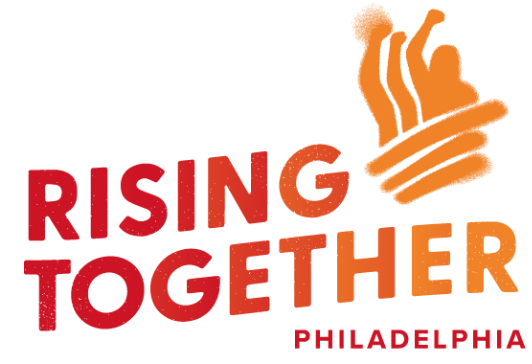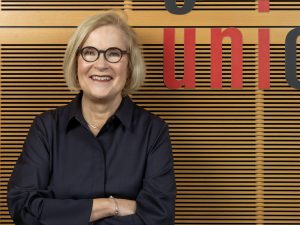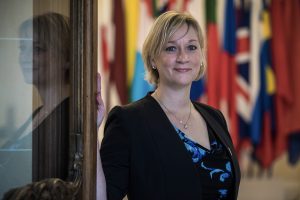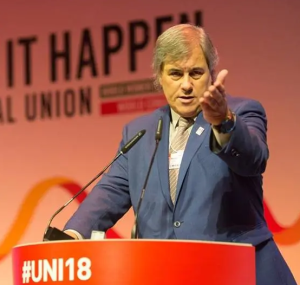About
27-30 August 2023
Philadelphia


“Our Congress aims to inspire hope, nourish solidarity and spark action among unions around the globe. We are excited to be rising together in Philadelphia to set a path that will improve workers’ lives worldwide.”
General Secretary, UNI Global Union
#UNIRisingTogether
UNI Global Union’s 6th World Congress will take place from Sunday, 27 August to Wednesday, 30 August 2023 at the Philadelphia Convention Centre in Philadelphia, Pennsylvania, United States.
Under the theme ‘Rising Together,’ the Congress will unite trade union leaders, representing 20 million workers worldwide, to build power and set a programme for action for the next four years.
With member unions in more than 150 countries, UNI Global Union brings together service sector workers to win better jobs and better lives. We use organizing, collective bargaining, broad stakeholder engagement and policy campaigns to create change on a global scale while strengthening capacity at a grassroots level.
In the U.S. alone, UNI affiliates represent millions of workers in industries as diverse a cleaning, care, entertainment, post, retail, tech, sport and more.
Key Themes
UNI’s will help working people shift power from the few to the many through a strong global trade union movement. To “Rise together” UNI will: grow unions through organizing; build power at multinational corporations; and protect and expand collective bargaining.
Businesses must respect the human rights of workers, no matter where they are in the world. Our goal is to establish effective and legally binding instruments to hold MNCs accountable That means ensuring a role for unions at all stages of binding due diligence and holding investors responsible for respect for rights across their portfolio companies.
As digitalization of the world of work accelerates, UNI and our affiliates are building collective union power to negotiate the impacts of the digital transformation. Workers should share the benefits of remote work, algorithmic management systems and artificial intelligence programs, and unions have the tools to address their risks.
The past years have emphasized the need for workplace representation and regulation to protect workers’ health and safety. UNI and our affiliates also continuing to develop strategies to organize — and bargain — around health and safety and to promote independent health and safety committees.
A sustainable future requires a new, inclusive and green economic model. This will require coordinated action to achieve increases in pay and purchasing power for all. Social protection which safeguards a decent standard of living must be expanded, and we will continue our campaigns for a more inclusive global economy.
UNI has a proud tradition of working together for a world of justice, equality and solidarity and standing up against racism and discrimination of any form. Economic justice cannot be delivered without racial justice and the fight against racism and nationalism fuelled by extremist parties and governments in many countries remains crucial. Our commitment to fighting prejudice against LGBTI+ workers is a key part of this area of work, and we continue to work with other GUFs to coordinate actions to address LGBTI+ issues.
We recognize the climate crisis is the most urgent issue facing humanity. There is a pressing need for action to transition towards a zero-carbon economy and trade unions must be at the core of this transformation. UNI is developing its work on climate issues to support affiliates in green collective bargaining, ensuring the voices of our members are heard in the global climate debates and identifying sector specific challenges and strategies to support a just transition for services workers.
Rampant discrimination in the world of work — in all forms — is a growing barrier to a truly just and equal society. Gender-based violence, particularly domestic violence, skyrocketed during Covid-19, creating a shadow pandemic. Gender-related issues cannot be dealt with in isolation, and as unions, collective bargaining is a critical tool to help promote equality, diversity, and inclusion. UNI continues to lead on gender equality issues, actively engaging to end the gender pay and pensions gap, supporting equal participation in the labor market and ensuring that training and development programs for women suit their work life arrangements.
Young people remain three times as likely to be unemployed, creating significant instability amongst young workers. It is crucial to involve young members in the design, discussion and adoption of policies regarding the new world of work, but we must also continue to make space for young people in our unions. Youth issues should be included in collective bargaining and negotiation demands and we must ensure proper access for young trade unionists in their decision-making bodies.
UNI is proud of its track record in working towards a peaceful world, but geo-political tensions sadly ensure that we are a long way from achieving peace for all. UNI is clear that universal and lasting peace can only be established through social justice, respect for human rights and a decent standard of living for all. This means we must continue to protect but also seek to expand democratic space and continue to campaign for disarmament so that the money that goes for arms can be used instead for social protection and inclusive growth and development. Countries of specific concern will also be highlighted under this agenda item.
UNI Global Union Leadership
Christy Hoffman was elected General Secretary of UNI Global Union in 2018, having served as Deputy General Secretary from 2010 and earlier as the Head of UNI Property Services. Under her leadership, UNI increased its visibility and advocacy for worker empowerment through unions, deepened its capacity to influence corporate behaviour through investor and legal strategies and coordinated bargaining and policy responses to the pandemic and its consequences in UNI sectors.
She has also been instrumental in the development of UNI’s organizing programme, which includes winning agreements with multinational companies to secure the right to organize and support for campaigns through training, capacity and solidarity.
Her work at UNI followed more than 25 years of experience as a U.S.-based trade unionist, beginning as an IAM shop steward in a jet engine factory, later as an organizer and finally as legal counsel to U.S. unions including the Mineworkers, Teamsters and SEIU.
An influential advocate for corporate accountability and the human rights of workers, Christy negotiated the ground-breaking Accord for Fire and Building Safety in Bangladesh, now known as the International Accord, and arbitrated its provisions. Additionally, she has been a leading voice for work with dignity in the digital age.
Christy holds a Juris Doctor from NYU Law School and a BA in Economics from Smith College.
Alke Boessiger became Deputy General Secretary of UNI Global Union in June 2018, where she leads UNI staff, finances and administration and oversees a number of strategic policy areas as well as external stakeholder engagement.
Working in leadership roles at UNI for some twenty years, she previously headed two of UNI’s largest sectors, Commerce and ICTS, where she was instrumental in securing numerous global agreements safeguarding worker rights in multinational companies, including global retailers Carrefour and Inditex.
She is a member of the steering committee of the International Accord, a legally-binding agreement between multinational companies, retailers and trade unions which improves health and safety standards in Bangladesh’s global fast-fashion manufacturing hub. Recently, Alke played a key role in negotiating an agreement which expands the International Accord to Pakistan to improve workplace safety in that country. She is Director of the RMG Sustainability Council, as well.
Alke’s early career includes campaigns and organization work at ver.di, the German service industries trade union, after working at Deutsche Bank where she was a member of the collective bargaining commission for the German banking sector.
Alke Boessiger was born in the East German town of Potsdam in 1973, speaks three languages fluently.
Argentinian trade union leader, Ruben Cortina was elected World President of UNI Global Union in 2018. As President, he has helped guide UNI during the pandemic to protect workers’ health and safety, defend human rights and increase organizing.
Ruben was previously elected President of UNI Americas for three consecutive terms where he worked to expand organizing and strengthen unions in North and Latin America. He was also head of UNI Commerce globally.
Ruben has a longstanding track record as a labour activist and has been a union leader at the Federation of Commerce and Services Employees (FAECYS) for over thirty-five years, where he is Secretary for International Affairs.
Earlier in his career, Ruben was elected Secretary of Culture and Trade Union Training of the Local Union of the City of Buenos Aires, which led him to take up several senior positions within Argentina’s Labour Ministry, including Director of International Affairs.
As a vocal student leader, Ruben was forced to abandon his law degree and go into hiding under the country’s military dictatorship, before later returning to his studies. He is now one of Argentina’s foremost experts in labour law and a university professor, as well as head of the Labour World Institute in the country, which is dedicated to research and training on trade union issues.




